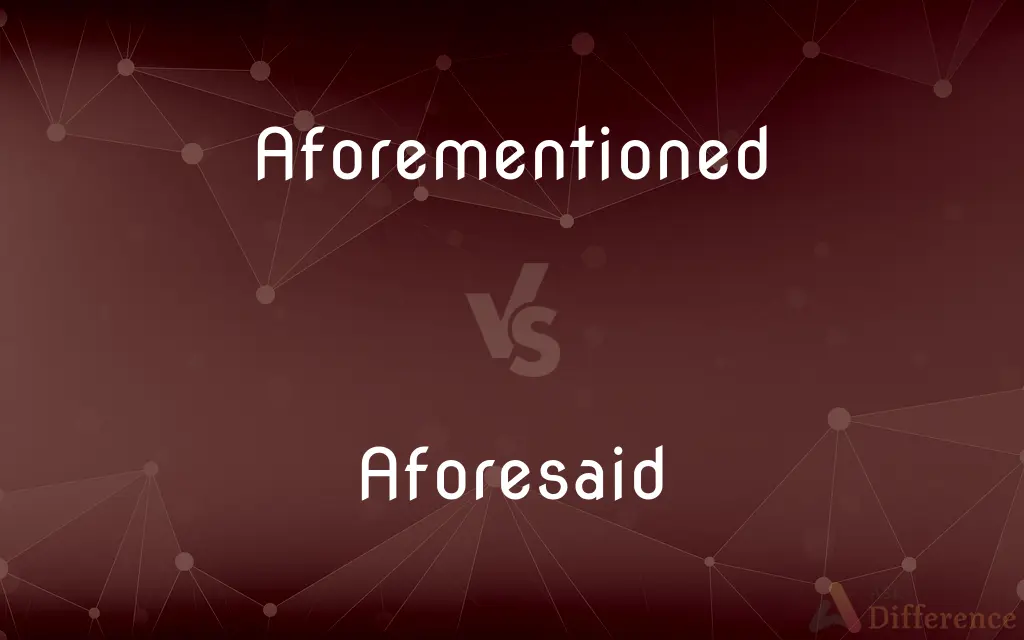Aforementioned vs. Aforesaid — What's the Difference?
By Urooj Arif & Maham Liaqat — Updated on April 21, 2024
"Aforementioned" refers to something mentioned earlier in a text, while "aforesaid" also refers to previously mentioned items but is more formal and less common in modern usage.

Difference Between Aforementioned and Aforesaid
Table of Contents
ADVERTISEMENT
Key Differences
The term "aforementioned" is commonly used in both legal and general contexts to refer to something previously stated within a document or discussion, whereas "aforesaid" tends to appear more in legal documents and is considered slightly more archaic.
"Aforementioned" is typically found in academic writing and business communications to help clarify references to earlier points, while "aforesaid" often serves a similar purpose but might be encountered more in contracts or legal statutes.
When using "aforementioned," the tone can be somewhat less formal and more accessible to a general audience, whereas using "aforesaid" may lend a more formal or traditional tone to the text.
The choice between "aforementioned" and "aforesaid" can reflect the writer’s preference for contemporary versus traditional language styles; "aforementioned" is more likely to be understood by a broader audience.
In terms of usage, "aforementioned" integrates smoothly into most modern writing frameworks, making it a versatile choice, on the other hand, "aforesaid" might be used to intentionally evoke a more solemn or established tone, particularly in legal contexts.
ADVERTISEMENT
Comparison Chart
Definition
Refers to something mentioned earlier in the text.
Also refers to previously mentioned items, more formally.
Usage Context
Common in academic, legal, and business communications.
Primarily used in formal legal documents.
Tone
Generally less formal, more modern.
More formal, traditional, and slightly archaic.
Audience
Suitable for a general audience.
Often used for a specialized audience, such as legal professionals.
Language Style
Contemporary and easily integrated into modern writing.
Traditional, often used to evoke a formal or solemn tone.
Compare with Definitions
Aforementioned
Previously mentioned in the text.
The aforementioned studies indicate a trend.
Aforesaid
Previously mentioned, specifically in formal texts.
The aforesaid article outlines the legal procedures.
Aforementioned
Used to refer back to something discussed earlier.
The strategy involves the aforementioned marketing techniques.
Aforesaid
May be used to evoke a traditional or authoritative tone.
The obligations of the aforesaid agreement remain binding.
Aforementioned
Common in various forms of writing.
He agreed to the terms, referring to the aforementioned agreement.
Aforesaid
Used to refer to earlier mentioned legal elements or terms.
According to the aforesaid statute, the requirements are clear.
Aforementioned
Suitable for clarifying earlier content.
This decision aligns with the aforementioned objectives.
Aforesaid
Often found in legal or very formal documents.
The rights of the aforesaid parties are hereby established.
Aforementioned
Helps in referencing earlier points without repetition.
Such actions contradict the aforementioned policies.
Aforesaid
Implies a formal tone and setting.
The aforesaid conditions must be met by all parties involved.
Aforementioned
Denoting a thing or person previously mentioned
Songs from the aforementioned album
Aforesaid
Spoken of earlier.
Aforementioned
Mentioned previously.
Aforesaid
Previously stated; said or named before.
Aforementioned
The one or ones mentioned previously.
Aforesaid
Said before, or in a preceding part; already described or identified.
Aforementioned
Previously mentioned.
It wasn't until later that we realized that the aforementioned caller and this taciturn man were the same person.
Aforesaid
Being the one previously mentioned or spoken of;
Works of all the aforementioned authors
Said party has denied the charges
Aforementioned
(uncountable) The one or ones mentioned previously.
The judge read a list of prisoners' names. She then indicated that the aforementioned were to be set free.
Aforementioned
Previously mentioned; before-mentioned.
Aforementioned
Being the one previously mentioned or spoken of;
Works of all the aforementioned authors
Said party has denied the charges
Common Curiosities
Can "aforementioned" and "aforesaid" be used interchangeably?
They can often be used interchangeably, but "aforesaid" might sound overly formal in casual writing.
What is the difference between "aforementioned" and "aforesaid"?
"Aforementioned" is used more broadly and is less formal, while "aforesaid" is more formal and often found in legal contexts.
Why might one choose to use "aforesaid" instead of "aforementioned"?
Choosing "aforesaid" might be stylistically appropriate in formal legal writing to maintain a traditional tone.
Is there a preference for "aforementioned" in modern writing?
Yes, "aforementioned" is generally preferred in modern writing due to its versatility and broader appeal.
Can "aforesaid" appear in non-legal texts?
It can, though it's less common and may give an unusually formal tone to general prose.
Where is "aforesaid" typically used?
"Aforesaid" is typically used in legal documents and formal agreements.
Is "aforementioned" suitable for academic writing?
Yes, "aforementioned" is quite common and suitable for academic writing to refer back to previously discussed content.
Is "aforesaid" outdated?
While it is more traditional, "aforesaid" is still in use, particularly in formal legal contexts.
How does the use of "aforementioned" affect the readability of a text?
It generally makes texts more readable by helping clarify references without repetition.
How do "aforementioned" and "aforesaid" contribute to text coherence?
Both terms help in linking ideas and maintaining coherence by referring to earlier mentioned points.
What are some synonyms for "aforementioned"?
Synonyms include "previously mentioned," "earlier stated," and "above-mentioned."
Can the use of "aforesaid" impact the perception of a text?
Yes, it can make the text appear more formal and legally oriented.
What does "aforementioned" imply in a text?
It implies a reference to something that has been previously mentioned in the text, helping to avoid repetition.
What should be considered when choosing between "aforementioned" and "aforesaid"?
Consider the formality of the text, the audience, and the overall tone you aim to establish.
What are some synonyms for "aforesaid"?
Similar to "aforementioned," but with a more formal connotation like "above-named" or "forenamed."
Share Your Discovery

Previous Comparison
Rare vs. Unique
Next Comparison
Labourer vs. LaborerAuthor Spotlight
Written by
Urooj ArifUrooj is a skilled content writer at Ask Difference, known for her exceptional ability to simplify complex topics into engaging and informative content. With a passion for research and a flair for clear, concise writing, she consistently delivers articles that resonate with our diverse audience.
Co-written by
Maham Liaqat















































